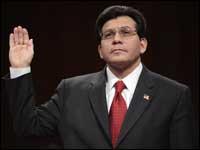Transcript
ALBERTO GONZALES:
I have no specific recollection -
SENATOR ARLEN SPECTER:
I do not find your testimony credible.
BOB GARFIELD:
That was Republican Senator Arlen Specter in July, questioning the veracity of Attorney General Alberto Gonzalez. The saga of fired U.S. attorneys, strong arming hospital visits and warrantless wiretaps took a dramatic new turn this week when Gonzales announced his resignation, presumably to spend more time with - his lawyers.
KATIE COURIC:
Today the ex-chief of staff to Alberto Gonzales swore under oath that his former boss was wrong when he said he wasn't involved in firing eight U.S. prosecutors last year.
MALE CORRESPONDENT:
Senator Leahy, this week Democrats called for a special prosecutor to determine if the Attorney General of the United States, the highest law enforcement officer in the government, has told your committee the truth!
KEITH OLBERMAN:
Did the embattled attorney general actually commitment perjury?
BOB GARFIELD:
For months, controversy of NSA eavesdropping and fired U.S. attorneys has had Gonzales on the defensive, as he found it impossible to square his sworn congressional testimony with that of subordinates and documentary evidence of his memos and emails.
His claims of sloppy communication, poor memory and simple misunderstanding have been scoffed at by Democrats and Republicans alike, and duly reported in the press. But in the major institutions of the media, hardly a soul has invoked the term that best describes the failure to tell the truth. The word is "lying."
New York Times public editor Clark Hoyt has looked at his own paper's use of language in this regard, and he joins me now. Clark, welcome to OTM.
CLARK HOYT:
Thank you for having me.
BOB GARFIELD:
Now, with the resignation of Attorney General Gonzales, we are simply reminded that through the last number of months there has been a lot of testimony in Congress which showed that somebody wasn't telling the truth - or was wildly misinformed. And we see some reflection of that in The New York Times editorials, phrases like "free and loose with the facts" and so forth.
But The Times and other newspapers seem loath to actually call Gonzales a liar. Why is that?
CLARK HOYT:
Well, I think, first of all, you have to differentiate between the news columns of a newspaper and the editorial columns, where opinion is appropriate. My own view is that a news organization should never say in its news columns the word "liar." It's such a loaded, judgmental word. It's certainly appropriate to use it if you're quoting someone, but adopting it yourself I think leaves you open to all kinds of accusations of partisanship.
Several years ago, we had a situation in which the Vice President, Mr. Cheney, made a statement about something, and in the news story about that, the very next sentence we put in the story was - I believe the words were "that was not true," and then proceeded to state what the facts were.
BOB GARFIELD:
What about the verb form the attorney general "lied" as opposed to, say, "dissembled" or some of the other synonyms that tend to get use in place of the "L" word?
CLARK HOYT:
You're stepping into difficult territory here. Do you know that the attorney general lied? Do you know that he had a remarkably poor memory or even a conveniently poor memory? Do you know that he attempted to mislead without lying? Do you know that the president lied or the vice president lied, or do you know that they did not tell the truth? And those are really two different things.
The one requires you to read a mind. The other simply requires you to compare what the statement was against the knowable facts. Again, I think that in an argument, in other words, in an editorial, you might choose to use that word.
You just quoted one phrase that was used. Another that was used in an editorial was "twisted and mutilated the truth beyond recognition." But the word "liar," "lying," "lied," The New York Times, in my observation - I did a quick check, and I found only one instance in relation to the attorney general.
BOB GARFIELD:
Well, I must say, you know, I've read The New York Times coverage of the U.S. attorney firing scandal, and [LAUGHS] I've read the facts arrayed before me and drawn my own conclusions, and my conclusion was that the attorney general has been lying through his teeth. [HOYT LAUGHS] If I can do it, I don't suppose that your other readers don't have enough information to draw the same conclusion.
What do you suppose it is in me that wants me to see The New York Times draw the same conclusion in an editorial, and probably the lead one, with the headline with the big "L" word in it?
CLARK HOYT:
Well, people want, I think, sometimes more from a news organization than the news organization is prepared to give them or should give them. And I get messages from people all the time, and reading between the lines, they want a result. They're angry about something and they want a result, and they think that the newspaper should provide a result for them. Or they've reached a conclusion about something and they're hungry for the newspaper to validate their conclusion by adopting their view or their language.
And I think that our role is to provide information for people to make their own judgments. Sometimes coverage will actually create a result, but quite often that isn't going to happen. And all of us may be frustrated about that, but our job is to lay it out there for people.
BOB GARFIELD:
Clark, thank you very much.
CLARK HOYT:
Bob, thank you.
BOB GARFIELD:
Clark Hoyt is the public editor of The New York Times.
[MUSIC UP AND UNDER]
Coming up, the very serious and slightly less serious reasons to run or hold photos. This is On the Media from NPR.

